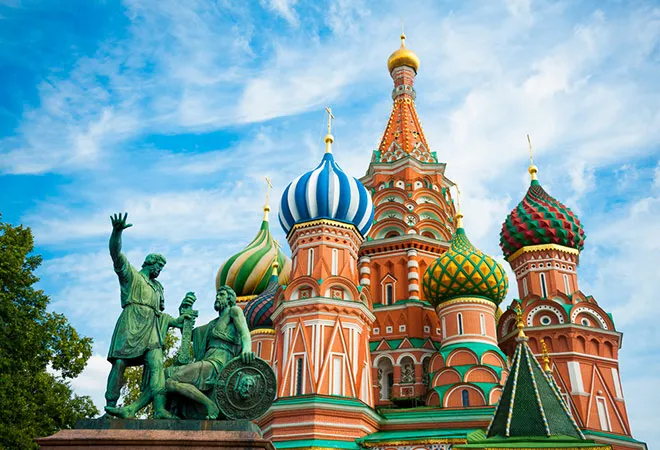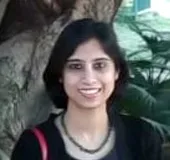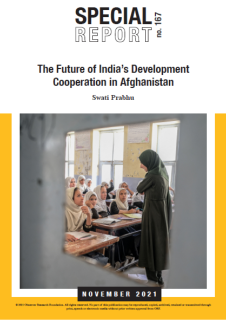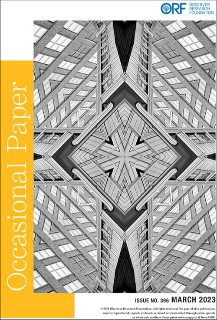
In what is widely seen as the first step towards determining the post-2024 Russian political leadership, President Vladimir Putin has announced a slew of changes to the constitution. On 11 February 2020, the State Duma will begin the second reading of the bill amending the constitution. From the announcement of the proposed changes by Putin on 15 January 2020, in his address to the Federal Assembly and their passage in the first reading took less than a week. By 20 January, the bill had already passed its first reading in the Duma by a unanimous vote. The second reading is expected to see proposals from the opposition parties as well as the 75-member working group that the president has set up to draft suggestions for amending the constitution.
However, if in this flurry of activity one was hoping for clarity on the key questions of Putin’s succession and his post-2024 role, not much has been forthcoming. While it is clear that the amendments mark the beginning of the succession process, which is still firmly being driven from the top, other details have been less than forthcoming.
The transfer of the power of appointment of the Prime Minister and his cabinet from the President to the Duma has been a key development. As per the current constitution, the president only needs consent of the Duma to appoint the prime minister and can dissolve the parliament if his choice is rejected three times. The changes will ensure that the president will have to comply with the choice of the Duma regarding the prime minister and his cabinet.
It must be noted that even without this power, the office of the president retains significant power (see table below). Putin himself noted in his January 15 speech that Russia will remain a ‘strong presidential republic.’
|
Powers of the Russian president as per the 1993 constitution:
1. President of the Russian Federation is the Head of State.
2. He/she determines the basic objectives of the internal and foreign policy of the State.
3. The president appoints, with the consent of the State Duma, the Chairman of the Government.
4. Has the right to chair meetings of the government.
5. Adopt decisions on the resignation of the government.
6. Nominates to the Duma a candidate for Chairman of the Central Bank.
7. As per the proposal of the Chairman of the government, appoints and relieves of their post deputy chairmen of the Government and federal ministers.
8. Presents to the Council of Federation candidates for the posts of judges of the Constitutional Court, Supreme Court, Supreme Arbitration Court, candidate for Prosecutor General, and appoints judges of other federal courts.
9. Forms and heads the Security Council of the Russian Federation.
10. Approves the military doctrine.
11. Appoints and dismisses plenipotentiary representatives.
12. Appoints and dismisses supreme commanders of the Armed Forces.
13. Shall dissolve the State Duma as per procedure provided for by the Constitution.
14. Announces referendums, submits draft laws to the State Duma and signs and promulgates federal laws.
15. Directs the foreign policy of the Russian Federation.
16. Is the Supreme Commander-in-Chief of the Armed Forces.
17. Can issue edicts and regulations. |
However, in a system that has faced criticism for being a super-presidential system, any additional power gained by the Parliament is a step forward. In fact, as scholars have noted, the long term impact of these proposed ‘checks and balances’ once Putin has exited the scene can have a positive impact. If combined with stronger political parties, independent institutions and a more assertive cabinet, there is a possibility that a stronger parliament would emerge in the future.

The imposition of the two-term limit for the post of president and removal of the word ‘consecutive’, which means that the future presidents will not be able to stand for elections after sitting out for a term has raised hopes that Putin will indeed leave the post in 2024. Given that the president has noted he will sign the amendments once the public referendum approves the changes, further strengthens this theory. If this term limit amendment stays, it will be a positive move, in that it imposes limits on long-term presidential power being exercised by one person. The provision ruling that any future presidential candidate must have had permanent residency for at least 25 years and must have never held foreign passport or residency permit will impact ability of opposition leaders based abroad to stand for the election.
These announcements, aimed to set the stage for a post-Putin system, did nothing to quell the speculation regarding his position after 2024 i.e. the end of the constitutionally mandated presidential term. The reworking of the State Council, from an advisory body headed by the President to the one whose status and role will be fixed in the constitution, has led to the belief that Putin himself plans to take over as its head. In theory, the State Council with enhanced powers will help Putin retain power in a supervisory capacity while also ensuring control over a future leader.
However, the amendment bill does not contain details about changes to the structure of the State Council, its chairmanship, power to execute decisions taken or even its position relative to that of the president. It does increase the ambit of its activities to include coordination among government authorities, define major directions of internal and external policies as well as the priority areas of socio-economic development of the state.
For these details, one will have to wait and see before assessing what a refurbished State Council will look like and what will its impact be on Russia’s political system. While on the one hand it might be seen as a way to set the ground for a solid institutional rule with Putin playing a supervisory role, it does possess the danger of emerging as an alternative center of power, setting up the stage for future clashes among different branches of the government. Hence, it will be important to see the kind of checks and balances that will control the State Council once its position is enshrined in the constitution.
This makes it only speculative at this stage to declare that Putin is envisaging a role for himself as the head of the State Council. If he does have a plan to retain power, it is far from clear as to what it will be. As a result, this lack of clarity in the constitutional amendment has made it difficult to determine the post-2024 contours of Russian political developments at the moment. While it is expected that Putin will remain in control in shaping the political system in the coming years, its exact form remains elusive.
Unless the second reading comes up with further details, particularly regarding the State Council, and till the question of who will succeed Putin becomes clear, the uncertainty in the political system will continue in the near future. This will be much to the disappointment of those who had hoped that a settlement of the political question will allow focus on other pressing economic issues that need immediate attention.
The views expressed above belong to the author(s). ORF research and analyses now available on Telegram! Click here to access our curated content — blogs, longforms and interviews.





 PREV
PREV


